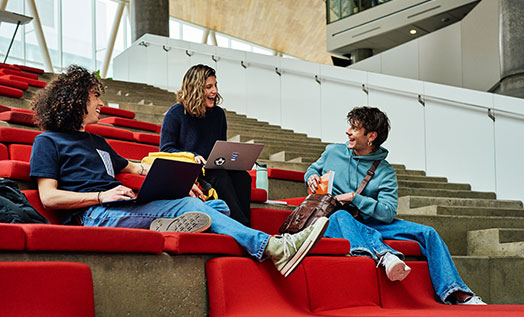Greater Montréal is in Québec, the largest province in Canada. Thanks to its prime location, the city has quick access to several major U.S. and Canadian cities (e.g.: Boston, New York City, Washington, D.C., Toronto and Ottawa).
Greater Montréal is the ideal place to live and work—and also to study.
So you’re asking yourself why you should choose Greater Montréal for your studies? Find out 7 good reasons for coming to study here.
World-class learning institutions
With 15 universities and over 100 colleges (private and public), Greater Montréal offers a wide array of disciplines to study in, whether at the university, college or vocational level. The universities in the city enjoy an excellent reputation with more than 350,000 students, including 50,000 international students. What’s more, with the largest pool of university researchers, the Greater Montréal research hub is one of the most highly funded in Canada.
Greater Montréal has outstanding study opportunities in various fields. Check out the list of Montréal learning institutions where you can study.
An affordable city
With a population of over 4.3 million, Greater Montréal stands out for its low cost of living. In fact, housing is twice as affordable as many big cities in North America and Europe. The cost of housing is therefore quite favourable for students who decide to come study in Montréal.
A dynamic cultural scene



It’s not easy to get bored in Greater Montréal. Whether you enjoy music, art, plays, sport, nature or other things, a good number of activities and events are organized year round in the city. With some 120 festivals a year, Montréal stands out as a real dynamic cultural hub for students from all around the world.
An international city
With 23% of the population foreign-born, Greater Montréal has over 120 cultural communities from every continent. What’s more, 56% of the population is bilingual (English and French) and nearly 24% speak three languages or more[1]. As a result, the city is known for being very open to the world. This openness translates into the city’s cultural scene through a variety of festivals such as the Festival international Nuits d’Afrique, the Arab World Festival of Montréal, and Black History Month, as well as through its restaurants and cafés with a world of flavours.
A promising job market
Greater Montréal has experienced the best job growth among the 20 largest urban areas in Canada and the U.S. (+3.6%) in 2017[2]. Moreover, it ranks first in the Americas for foreign investment[3]. With its favourable job market, international students with a study permit can gain experience in leading-edge industries such as aerospace, visual effects, video games, big data, virtual reality, life sciences and health technologies, or even fintech.
Study permits allow international students to work up to 20 hours per week* and they can work full time during vacations and breaks (e.g.: summer vacations).
*Update: From November 15, 2022, until December 31, 2023, international students who are in Canada and who have off-campus work authorization on their study permit will not be restricted by the 20-hour-per-week rule. Learn more.
A safe environment



Having a safe environment is key to being able to study in peace. Greater Montréal offers you that safety: you can go home alone at night or use public transit late at night without any worries. The Economist had ranked Montréal as one of the safest cities in the world (14th in the world and 4th in North America).
City designed on a human scale
Greater Montréal is a human-scale city that is easy to get around and it has something for everyone. Montréal has diverse neighbourhoods with unique characters that can be a good fit for families, professionals or students. From the historical neighbourhood of Old Montréal to Little Italy, you’ll notice that every area has a different look and feel that makes Montréal such an eclectic city.
Want to take the plunge and come study in Greater Montréal? Find out how you can do that.
[1] Source: Statistics Canada, 2016
[2] Source: Conference Board of Canada; U.S. Bureau of Labor Statistics.
[3] Source: WAVTEQ, City FDI Performance Index, 2018.
Facts & figures
Worldwide recognition
Greater Montréal is a metropolis recognized worldwide.
- Best student city in Canada (QS Best Student Cities, 2023)
- 2nd best student city in the Americas (QS Best Student Cities, 2023)
- 2nd best city in the world for remote workers (Workmotion, 2021)
- Best city in Canada and 9th in the world (TimeOut, 2022)
- Lowest crime index among the 20 largest cities in Canada and the U.S. (Numbeo, 2022)
- Best city in the Americas for its quality of life (Knight Frank, City Wellbeing Index, 2020)
- The most bilingual and trilingual population in Canada (Statistics Canada, 2016)
- Happiest city in the Americas and second in the world (Lonely Planet, 2018)
- Canada: best country in the world to study abroad (Educations.com, 2020)
- Most reputable city in the Americas (Reputation Institute, 2018)
- 2nd most walkable city in Canada (Walk Score, 2022)
- Best cycling city in North America (Luko, Global Bicycle Cities Index, 2019)

